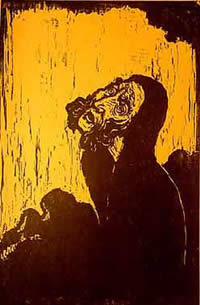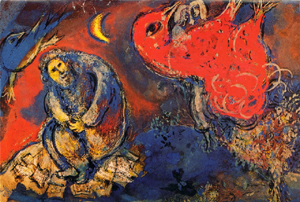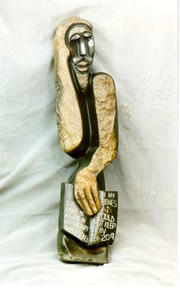For Sunday January 31, 2016
Lectionary Readings (Revised Common Lectionary, Year C)
Jeremiah 1:4–10
Psalm 71:1–6
1 Corinthians 13:1–13
Luke 4:21–30
When I was in college forty years ago, I started the practice of reading through the entire Bible at least once a year. Since the Old Testament was so long, sometimes boring, time consuming, and in my view back then something like a prologue to the "real" story, sometimes I would also read just the New Testament a couple more times.
In later years I abbreviated my practice by reading only the New Testament, or just the Psalms and the Gospels. On a weekend retreat, for example, reading through the New Testament (my version is 571 pages) isn't much longer than a novel. Eventually, this annual practice fell by the way side, but not before I became so familiar with the Bible that today I find it hard to read with fresh eyes.
Like lots of people do when they read the Bible, I would underline passages and jot little notes in the margins. Red, yellow, black, blue and fluorescent green — the colored highlighters now recall different annual readings.
 |
|
Jeremiah, Woodcut by Jacob Steinhardt (1887-1968).
|
Forty years after the fact, some of these scribbles are embarrassingly adolescent, but maybe that's the way it should be — it's a sign of growing up. Other marginalia recall important life passages.
So, it was with a feeling of déjà vu this week that I read the lectionary from Jeremiah 1:4–10, and noticed an old marginalia that I had written in pencil: "new baby #3, 11/90." At the time, we had just learned that my wife was pregnant with our third child. My note was a response to Jeremiah 1:5: "Before I formed you in the womb I knew you, before you were born I set you apart."
This is awfully powerful ancient poetry. It expresses a sentiment that's repeated elsewhere in the Bible — that every life is a sacred gift from God. The psalmist for this week declares, "you brought me forth from my mother's womb." (71:6).
Or Isaiah 49:1: "Before I was born, the Lord called me; / from my birth he has made mention of my name."
And most memorably, Psalm 139:13–16:
"For you created my inmost being;
you knit me together in my mother’s womb.
I praise you because I am fearfully and wonderfully made;
your works are wonderful,
I know that full well.
My frame was not hidden from you
when I was made in the secret place,
when I was woven together in the depths of the earth.
Your eyes saw my unformed body;
all the days ordained for me were written in your book
before one of them came to be."
Today our "new baby #3" is twenty-four.
But is this poetry still believable when we see dozens of bodies wash ashore on the islands of Lesbos and Lampedusa? When people are starving to death in the cold rain on the outskirts of Damascus? When a genetic defect causes spina bifida?
 |
|
Jeremiah fresco, Roman School, c 1120.
|
It's a fair question. An important question. And no one can speak for another person's experience.
But it's also a question that reveals our modern conceit and condescension — as if we're the first enlightened ones to agonize over war and starvation. Besides, how does viewing life as a biological accident give us a better perspective on Syria or the Holocaust?
The pages of the Bible are soaked in blood, beginning with Cain's fratricide, and full of believers and unbelievers alike anguishing over the gift of life, with all its blessings and sorrows.
The psalmist for this week worships God as his rock and fortress. He praises him for his mighty acts and marvelous deeds. But he also laments the frailty of old age. He fears being forsaken and forgotten by God. He's wary of the wickedness and cruelty of humanity. He describes himself as a "portent to many" — a grotesque spectacle, a sign of something ominous, or a symbol of calamity. "You have made me see troubles," he prays to God, "many and bitter."
Jeremiah struggled for forty years with a sense of failure, with violent opposition from detractors, and with deep discouragement. He was beaten (20:2), received death threats (26:8), imprisoned (37:15), thrown down a well (38:6), and derided as an unpatriotic crank and traitor. The prophets, priests and kings dismissed him as seditious. God's call on his life made his heart break and his bones tremble (23:9).
 |
|
Yvette Cauquil-Prince tapestry of Chagall's "Jeremiah".
|
When my father died in 1998, the last few days of his life he worked hard to made amends with each member of the family. Most touching of all was a phone call he made to my mother, to whom he was married for 33 years, but then divorced from for 25 years. Most vexing of all was a sibling who wouldn't return his calls.
After he died, my father donated his body to science for medical research. Eighteen months later, FedEx delivered his "cremains" to our house. I remember thinking that there had to be a better way to return such a sacred gift.
I opened the box, untied the twisty that secured the plastic liner, and experienced what others had described to me. These were not fluffy ashes, but gritty shards of bone. I took a pinch of the coarse remnants of my father and rubbed them between my thumb and fingers.
 |
|
Jeremiah by Andrew Mabanji, Zimbabwe, stone sculpture.
|
At his memorial service, I recalled taking comfort from a plaque that I saw every day that I went in and out of St. Joseph's Hospital in Tucson. Next to the main entrance of the hospital was a quote by Pope John Paul II: "Man's life comes from God. It is his gift, his image and imprint, a sharing in his breath of life. God, therefore, is the sole Lord of this life. Man cannot do with it as he wills."
My wife and I have just been challenged to scribble a new marginalia in our Bibles. Over the holidays we learned that next summer we'll become grandparents. We're marveling once again in the miracle of a new life, in the sacred mystery of a personal history: "grandchild #1, 01/16."
For further reflection
In his poem Pied Beauty the English poet Gerard Manley Hopkins (1844–1889) described our world as "dappled."
Glory be to God for dappled things —
For skies of couple-colour as a brinded cow;
For rose-moles all in stipple upon trout that swim;
Fresh-firecoal chestnut-falls; finches’ wings;
Landscape plotted and pieced — fold, fallow, and plough;
And all trades, their gear and tackle and trim.
All things counter, original, spare, strange;
Whatever is fickle, freckled (who knows how?)
With swift, slow; sweet, sour; adazzle, dim;
He fathers-forth whose beauty is past change:
Praise him.
Hopkins senses God's presence even, or especially, in "the dappled things" — things mottled as well as uniform, crooked as well as straight, sweet as well as sour, blemished as well as beautiful, surprising as well as predictable, and, yes, in things painful as well as pleasurable.
Image credits: (1) Safrai.com; (2) ChristusRex.org; (3) Marquette.edu; and (4) SaintJohnsAbbey.org.





